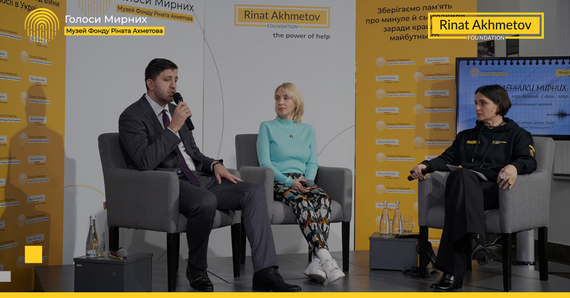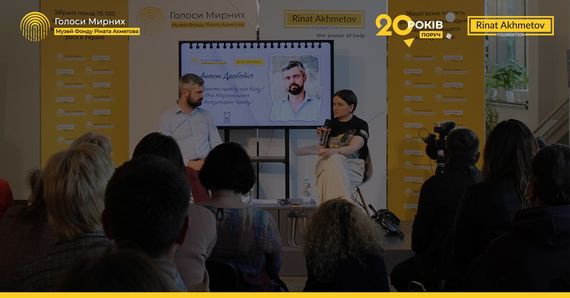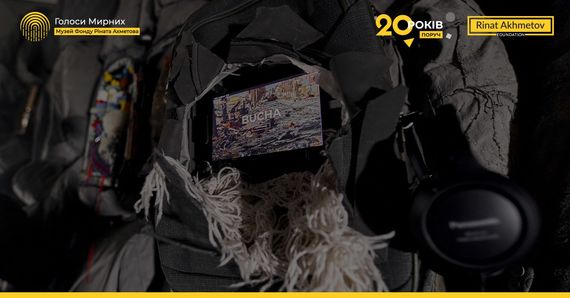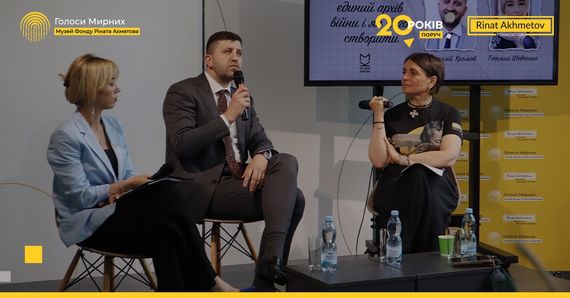The Author of the truth about the war Is each of us: panel discussion “Diaries as Ego-Documents of War” held in Kyiv

On October 30, 2024, a panel discussion titled “Diaries as Ego-Documents of War” took place in Kyiv. It was held as part of the presentation of the documentary “Diaries of Civilians: Voices of Survivors and Those Who Did Not Survive” at the Museum of Civilian Voices by the Rinat Akhmetov Foundation. The space centers on two diaries from Mariupol that were donated to the Museum: those of Kateryna Savenko and Volodymyr Velychko. These are stories of tragedy and survival, united by firsthand truths about the horrors of war.
“We will continue to collect stories at the Museum of Civilian Voices and will do everything possible to create in Ukraine a unique, perhaps world-leading, culture of ego-documents, oral history, and museums dedicated to ordinary people. A culture of memory from the first-person perspective, where there is no single official doctrine, and where each of you is an author of the truth about this war,” - emphasized Nataliya Yemchenko, Member of the Supervisory Board of the Rinat Akhmetov Foundation, who was a speaker and moderator of the discussion.
The conversation explored the significance of ego-documents in the context of war and their role as records created by both professionals and ordinary people who document wartime events. Anatolii Khromov, Head of the State Archival Service of Ukraine, stressed the importance of granting individual documents archival status at the state level.
Anatolii Khromov said: “Ukraine is one of the largest countries in Europe in terms of its collection of archival documents: billions of pages. However, there are very few documents that were created by an individual. The vast majority of the documents in the National Archival Fond are management documents. What will we leave for future generations about these extraordinary events? The diaries we are talking about today are about the desire to preserve the testimonies. We need a commission that will grant the diary the status of a document of the National Archive. This is extremely important.”
Diana Popova, CEO of the Museum of the History of the City of Kyiv, noted that personal, individually created documents, including diaries, can be especially valuable for preserving the memory of the events of the war.
Diana Popova said: “Our understanding of the Holocaust is greatly enhanced by stories like Anne Frank's diary. When we speak of the Holodomor, we remember Gareth Jones’ diary, which allowed the world to feel the pain that Ukrainians felt. Kateryna Savenko's diary will be our voice at our equivalent of the upcoming Nuremberg trials. We do not know when it will be, what it will be like... But there are already so many of these voices collected by the Museum of Civilian Voices. Even if people do not physically live, their voices will be heard. And their testimonies will be essential at this trial.”
Since 2014, the Museum of Civilian Voices has been collecting, preserving, and sharing the testimonies of civilians about their experiences during the war in Ukraine. It is now the largest such archive in the world and a valuable source of truth about the war, containing over 120,000 stories and growing daily.
The Museum of Civilian Voices is open to the public from 12:00 to 19:00, Wednesday through Sunday, at 7 Bohdan Khmelnytsky Street, first floor of the Kyiv City History Museum.



